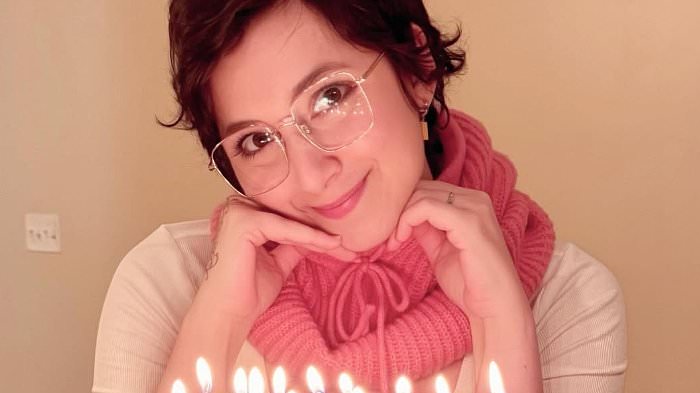Share this @internewscast.com
When Emma Dimery was told she had terminal colon cancer at 23, her life was turned upside down.
She had just graduated art college and had a budding career ahead of her – then she was given a diagnosis that meant the odds were against her even making it to her 30th birthday.
‘At first the gravity of it all didn’t really sink in, I was more concerned with how it would affect my social or dating life,’ she told DailyMail.com.
‘It took me more than a year to understand that this will be a part of my life forever.’
But miraculously, 12 years on, she is happy and thriving thanks to a clinical trial which helped save her life after numerous round of unsuccessful chemotherapy and radiation treatments.
The artist and illustrator from Minnesota is now sharing her story in a bid to give others hope and to also raise awareness around the signs of colon cancer so it can be caught sooner.
She said that the first symptoms she should have paid more attention to in hindsight were fatigue, weakness, and intense stomach cramps which progressively worsened.
However, it was only during an annual physical that Emma realized there was something seriously wrong with her health.

When Emma Dimery was landed with the news that she had terminal colon cancer at 23 her life turned upsidedown. But miraculously, 12 years on, she is happy and thriving thanks to a clinical trial
She revealed: ‘I just thought I was burning the candle at both ends. I went to my yearly physical and thought nothing of it when they took blood.
‘When I got home, I fell asleep for almost 48 hours, and then woke to my mom calling me repeatedly from outside of my apartment.
‘She was in a real panic saying my doctor couldn’t get hold of me and I needed to go to the ER immediately.
‘From there, after an array of tests, a colonoscopy revealed I had advanced colon cancer. I couldn’t believe it.’
Emma revealed that in December 2013, doctors found two tumors in her colon, one the size of a softball and the other the size of a golf ball.
Medics told her it had progressed into stage 4 colon cancer and a treatment plan was immediately drawn up.
Emma’s story comes amid an explosion in ‘early onset’ cancers in the US.
By 2019 the rates in young people were 79 percent higher compared to in 1990.
The five-year survival rate for colon cancer is 64 percent, but that drops to 13 percent if the cancer has spread, which commonly occurs in early-onset cases because symptoms are often not present or are misdiagnosed until the cancer has spread throughout the body.
Symptoms include changes in bathroom habits, blood in stool, weakness, fatigue, nausea, loss of appetite, a lump in the abdomen or rectum, diarrhea, abdominal cramping, constipation and vomiting.
Blood tests revealed that Emma also had a low red blood cell count.
The American Cancer Society explains that sometimes blood can be seen in the stool or make it look darker, but often the stool looks normal.
‘But over time, the blood loss can build up and can lead to low red blood cell counts.’
After being diagnosed, Emma underwent surgery to remove the most affected part of her colon, and then she had chemotherapy for around a year, with breaks in between each round.
Despite these interventions, the cancer continued to spread and Emma had to undergo a partial hysterectomy to removed her uterus in 2016 after the disease hit tissues surrounding her reproductive system.
From there, she kept going with chemotherapy and radiation therapies and she also started immunotherapy.

Emma’s story comes amid an explosion in ‘early onset’ cancers in the US. By 2019 the rates in young people were 79 percent higher compared to in 1990

The above graph shows the increase in US colorectal cancers in men and women from 2000 through 2021
This treatment approach harnesses the body’s own immune system to fight cancer.
Instead of directly targeting cancer cells, immunotherapy aims to boost or modify the immune system to recognize and attack them more effectively.
This treatment can be administered in various ways, including intravenously, through injections and in pill form.
But after a short time experimenting with immunotherapy, Emma’s doctor told her about a clinical trial out of the University of Minnesota and this is what she deems a ‘game changer’.
In the 2020 trial, led by Dr Emil Lou, cancer cells were retrieved from Emma and altered in a lab using pioneering gene editing technology.
These altered cells, which have a better defense against tumors, were then reintroduced to Emma’s body via infusion.
Amazingly, it took just one treatment to see results and she was declared cancer-free two months later.
Dr Lou deemed Emma’s response to the experimental trial – which saw 12 participants enroll – as ‘remarkable’.
Among the other trial participants, the cancer specialist revealed that several individuals experienced ‘stabilization of their disease’, which indicated that their tumors had stopped growing.
His team are now looking to build on the success of the gene editing technology and to see how it could be rolled out on a larger scale.
Touching on what her biggest sources of strength have been during her cancer battle, Emma told this website: ‘By far my biggest source of strength has been my amazing family and friends.

After being diagnosed, Emma underwent surgery to remove the most affected part of her colon, and then she had chemotherapy for around a year, with breaks inbetween each round

Emma met her husband Andrew about a year and a half after being diagnosed, and she says he has been ‘steadfastly by my side through everything’
‘My mom, Barbara and big sister, Anne and myself had dubbed ourselves Team Weston (our family name before marriage).
‘I met my husband, Andrew about a year and a half after being diagnosed, and he has been steadfastly by my side through everything and I am so, so lucky to have them!’
Research indicates a link between the consumption of red meat and ultra-processed foods and an increased risk of colon cancer.
Emma says since her diagnosis, she has made a conscious effort to cut these from her diet and ‘keep in tune’ with her body.
Food aside, the brunette says another change triggered by her cancer is her mindset.
She explains: ‘Dealing with cancer for more than a decade has taught me what’s really important in life, to not take very good day for granted, and to realize how important it is not only be active within this ever growing community of young cancer patients, but to give back however you can.
‘In some ways I feel like I’m behind my peers in terms of career and family life, but in other ways, I feel more mature and steadfast.’
Offering advice to others in terms of being alert to cancer, Emma concludes: ‘Knowing one’s family background or history of cancer is pretty critical.
‘If you have a lot of cancer in your family, like I do, I advise paying close attention to your body and getting screened and tested as soon as or as regularly as you can.
‘Colon cancer doesn’t necessarily show a lot of symptoms until it is somewhat advanced – so for young people, it’s harder to detect if something is wrong.’













